Elon Musk claims to have implanted a chip in a patient’s brain and calls it “telepathy”

Billionaire Elon Musk announced that his company Neuralink, which is developing a new brain-computer interface, has implanted its first device in a patient. The brain chip, which he calls “Telepathy”, was installed on Sunday and, according to the businessman, will allow him to control his phone or computer “just by thinking”. Although Neuralink has come under fire for the deaths of several monkeys during preliminary experiments, the company received the go-ahead from an independent review board last September to begin recruiting for its first human clinical trial.
As is typical with many of his initiatives, Musk revealed few details about Neuralink’s first brain implant via his own social media platform, aside from the fact that early results showed some “promising neural spikes or nerve impulses.” that the patient is “recovering well.”
However, Musk noted that the first users “will be those who have lost the use of their limbs.” In this sense, he wrote: “Imagine if Stephen Hawking could communicate faster than a typist. That’s the goal.” .
Besides SpaceX and Tesla, Neuralink is one of Musk’s greatest ambitions. In November 2022, he predicted that the company would begin human trials within six months. He had to wait a little longer. The company then released a video of two monkeys moving computer cursors with their minds. It was only last May that Neuralink received approval from the US Food and Drug Administration (FDA) to begin human trials, and in September received approval from an independent review board to begin recruiting personnel to test the implant in humans. The number of participants is unknown, but at the time it was reported that they were people with paralysis due to cervical spinal cord injury or amyotrophic lateral sclerosis. The trial is expected to last about six years.
“Ultra-thin” threads for transmitting brain signals
The study uses a robot to surgically place a brain-computer interface (BCI) implant, made of 64 flexible threads thinner than a human hair, into the area of the brain that controls the intention to move. In theory, these threads allow their experimental implant, powered by a battery that can be charged wirelessly, to record and transmit brain signals, also wirelessly, to an app that deciphers how a person is going to move. Its original goal is to allow people to control a computer cursor or keyboard using only their thoughts.
Neuralink’s work has not been without controversy. Last September, the Physicians Committee for Responsible Medicine demanded an investigation into the firm over the deaths of twelve monkeys during testing, although Musk himself said in X that no monkeys died as a result of one of his implants. The millionaire added that in order to minimize the risk to healthy monkeys, terminal individuals (who are already close to death) were chosen.
However, the organization found the statement to be “false and misleading.” According to the group, although Neuralink used three terminal monkeys that did not recover from surgery, it euthanized twelve previously healthy animals, a direct result of problems with the company’s implant.
